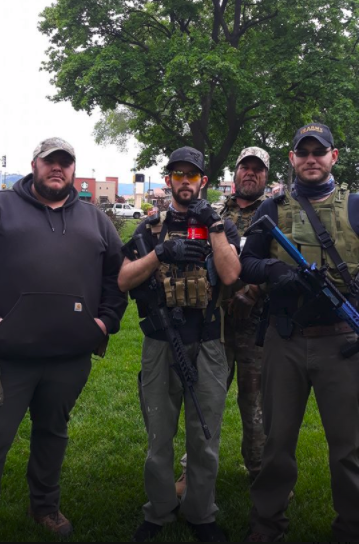Get the Facts on Patriot and Militia Groups in Montana
Militia members at the “I Can’t Breathe” rally in Kalispell on June 6.
Militia and patriot groups are back in the news, and we’re seeing the impact of their activity. Misinformation is spreading like wildfire, law enforcement officers and elected officials are being threatened, and ugly confrontations are cropping up. They are generating conflict that is dividing our communities.
The potential for violence is always a concern with militia and patriot groups, but we want to be clear: the biggest problem with these anti-government groups is it’s the amount of misinformation they inject into public discourse.
But that’s just one of the ways patriot and militia groups erode safety in Montana. This week, we’re rolling out a series about the problems these groups bring and what communities can do about it. Check your inbox or this website each day to read about a new topic.
Tomorrow, we’ll get into the reasons why their version of misinformation itself is so dangerous, but today, we want to remind you that their misinformation is an intentional strategy. If we’re focused on their talking points, we’re not discussing crucial issues and solving problems that make our communities stronger. You’ve probably already seen this tactic in action.
When COVID-19 hit, these groups changed the topic from public health and caring for our neighbors to conspiracy theories and martial law.
When George Floyd was murdered in Minneapolis, they changed the topic from racial profiling and police brutality to false rumors about antifa, looting, and statues being vandalized.
When local teenagers organized a Black Lives Matter in Kalispell, the news coverage and attention went to the armed militia and patriot group supporters, not the hundreds of Flathead Valley community members who supported the Black Lives Matter movement and Black community members.
It’s important for us to understand the strategies that militia and patriot groups use, but it’s more important to support people who face discrimination. As you read statements from these anti-government groups or media coverage, please keep asking the questions, “Who needs to be centered in these conversations? Are those people’s concerns are the topics we’re actually talking about?”
We know that militia and patriot groups will only center their own agendas — not the safety of the entire community.
For more guidance on centering discussions on people who face discrimination, we recommend this article by Ijeoma Oluo, author of the book So You Want to Talk About Race.

